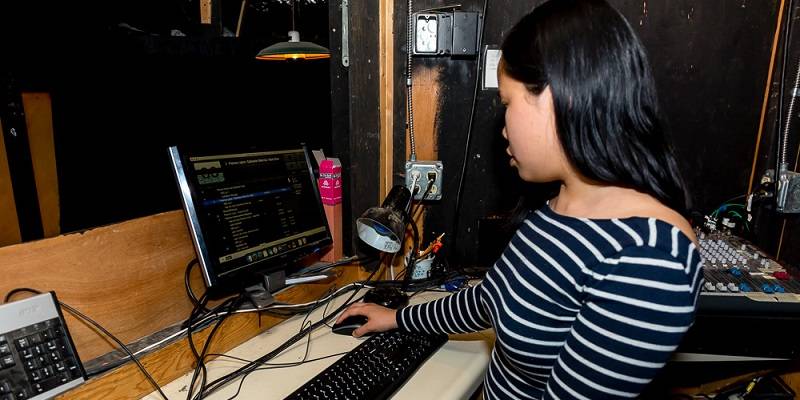Spotlight Backstage is a new endeavor by SP Arts to shine a light where it’s rarely seen in local theatre, despite the fact that these people intentionally wear black in order to escape notice. Still, stage productions stand on the back of tireless tech crews, and even more, once you start talking with “theatre folk”, directors and actors will actively bring up names with the descriptors “genius”, “amazing”, and “integral”. We thought we’d take some time to get to know these necessary and talented support staff, and give our readers a chance to really understand what it takes to make theatre happen.
Our first subject absolutely had to be Yen Vi Ho. Not only did it seem logical to begin with a stage manager, the person who ties everyone together, but this one in particular. While trying to reach Yen Vi for the interview, she let us know she was interested, but was subbing for a show at Parkland while heading up a production at the Station and coordinating the next, which was in rehearsal. Clearly, if she has her hands in so many shows, she must be doing something right. Eventually, writer John Milas got a chance to sit down and talk with this in-demand stage manager and shine the spotlight backstage.

Smile Politely: What exactly is stage management?
Yen Vi Ho: The stage manager is the liaison between every person involved in a production. I communicate with the director, actors, designers, technicians, and stage crew throughout the entire production process. I’m also the one in charge during performances to ensure the show is running smoothly and that the integrity of the director’s vision is maintained.
SP: What are some common misconceptions people have regarding stage management?
YVH: I don’t know… that we’re bossy? I’ve also heard people confuse stage managing with directing.
SP: Who is the most famous stage manager? You’re supposed to know these things right?
YVH: I couldn’t possibly tell you, and that kind of tells you about the profession of stage management.
SP: If not the most well known stage manager, who influenced you to pursue this line of work? Is this how you make your living now?
YVH: Karen Quisenberry was the chair of Stage Management at U of I when I was in the theatre program for a short period of time. I was very green and still figuring out what area of theatre I wanted to focus on. She was the one who inspired me to consider stage management as my course of study.
I have a non-theatre day job like most people who participate in theatre. It’s my preoccupation rather than my occupation.
SP: How long have you been a stage manager, and at what theatres have you worked? How many shows have you done?
YVH: I’ve been stage managing since 2006, primarily at Parkland College Theatre and the Station Theatre. There was one show for CUTC and I stage managed several plays while I was getting my BA at SIU Carbondale. I am now working on my 20th local production.
 SP: Why do you think no one has ever interviewed you before?
SP: Why do you think no one has ever interviewed you before?
YVH: Most people don’t know what stage management is, let alone who does it. It’s not a visible or glamorous role.
SP: What are the unnoticeable tasks for a stage manager to successfully complete in order to support the visibly appreciable work happening before an audience?
YVH: What a great question. So many notes. Sooo many emails. So many reports, schedules, reminders, conferences, explanations…and this is all before there is even an audience. My job is to provide support to everyone involved in a production and to focus on the details and logistics in order for them to have the freedom to do their specific aspect of the show.
SP: As a stage manager, when can you tell you’re doing your job the right way? What kinds of mistakes have you made in the process of learning?
YVH: I’ve done my job if I feel I can answer any questions the team has and if I’ve done everything I can to prepare them for a smooth performance. And if I can think quickly when something goes wrong. Of course I don’t know that definitively until after something goes wrong. In the past, I’d panic so easily when something did not go according to plan, but that also spoke to how unprepared I was. If I’m calm under pressure and can come up with a solution when needed, I’m satisfied.
SP: Will the audience notice either way if the job is done correctly or incorrectly?
YVH: Anyone paying attention will notice if a light cue is wrong or a sound cue is off. If the show is delayed in starting, they definitely notice. Most of the time you know you’ve done a good job when the audience is unaware of anything except what you want them to be aware of.
SP: Do you have any personal favorite or least favorite experiences as a stage manager?
YVH: The moment I’m in the booth and I’ve called a perfect show or when I get to watch an audience experience a beautiful moment onstage that may have taken months to execute – it’s exhilarating. Alternatively, I hate being able to see audience members on their cell phones.
(ed note — seriously, folks: stop doing this. — rk)
SP: What about the job rewards you most?
YVH: I love good theatre. I love going to it, and I love being a part of it from day one to the closing night curtain call. To be in this process from the very beginning and to see how the actors and the technicians intertwine the artistic and technical elements to bring a play to life – it can be fucking magical. And it’s never the same! That performance is just for that night with that audience and then it’s gone. And being the stage manager, I get to marshal everyone with this common goal: let’s tell people a story.
———
Although you probably have not-noticed Yen Vi’s work before, your next opportunity begins this weekend at the Celebration Company at the Station Theatre‘s production of Leaving Iowa.
About John Milas …
John Milas grew up in Champaign and studied creative writing at the Univeristy of Illinois. If you think of a good person to interview for Spotlight Backstage, email him, but if not, just follow him on Twitter @johnwlits.
All images by Scott Wells (except John Milas’ headshot courtesy Larry Kanfer)
About Scott Wells…
Scott is a U.S. Navy veteran and a graduate of the University of Illinois. He has been a photographer and writer for Smile Politely since March of 2015.









 About John Milas …
About John Milas … About Scott Wells…
About Scott Wells…